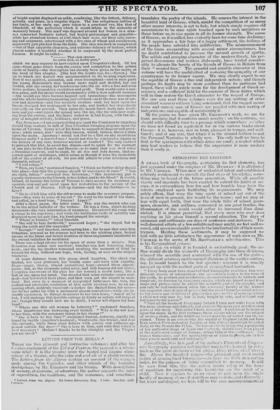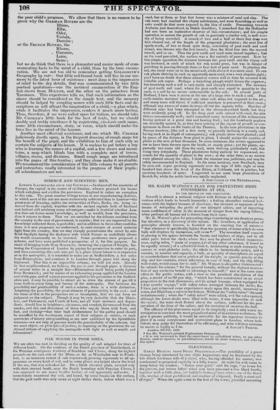GEOGRAPHY FOR CHILDREN.
A SMALL book of Geography, containing its first elements, has just appeared under the auspices of Mr. MURRAY : it is to Mr. CROKER. When men of undoubted talent and established celebrity condescend to smooth the first steps of knotvhslge, some- thing may be hoped of the future generation. While all possible vigour and ingenuity has been exerted to extend the limits of sci- ence, it is extraordinary how few and how humble have been the talents employed upon facilitating its acquirements. We may safely affirm, that were the time snent at school cut out of the lives of men in general, few would he the worse ; and we may al- lege with equal truth, that were the whole tribe of school gram- mars, elements, and outlines, consumed in one great bonfire, the illumination of the world would rather be increased than dimi- nished. It is almost proverbial, that every man who ever does anything in life gives himself a second education. The days of grammar and arithmetic are days of confusion and darkness. The well-directed efforts of a few enlightened men might, we feel well as- sured, add seven invaluable years to the intellectual life of their coun- trymen. Holding these sentiments, it may he supposed we hail with no little satisfaction the appearance of such men as Mr. CROKER in the arena of Mr. BaorroirAm's schoolmaster. This is his Geographical primer.
The idea on which it is founded is undoubtedly good: the au- thor would divide the elements of Geography into three divisions, whereof the scientific part connected with the use of the globes, the different arbitrary mathematical divisions of the earths surface, &c. he would banish to the last quarter; whereas it is usually mingled up with the earliest parts of geographical instruction.
" Every body must have observed that Geography combines two very different classes of information : the nne--whicli relates to the form of the earth, its position and revolutions, its measurements by latitude and longitude, its division by imaginary circles, which are traced round it on maps and globes—may be called the scientific part of Geography, mind. can only be well understood when the reaseeires faculty of the learner has acquired some degree of power; but the Nect,nf? branch—which relate.; to the names and siiya!ices of places—is a mere walla c/' mesisey, tvliicie a child not only may be, but is best, taught by rote, and wttl.out any reference to his reason."
" Now all the books of Geography (which I have met with) begin with the more abstruse and difficult, and postpone the more easy and technical parts of the study. This order I have reversed. I endeavour to impress upon the mind, in the first instance, those things which are the subject of memory alone, and for which no el'Itslat need be, or indeed can he, as- signed. There is no 701,011 why the capital of England might not have been named Paris instead of Loudon, or why Pnlefini should not be called Italy, or the Danube the rOgat. No reason can be serves why a peninsula of the particular shape of Spin and Portugal, should have been placed at the south-west corner of Europe, rather than at the south-east. The names themselves, and the appropriation of them to places, arc in this view purely accidental and imaginary."
Accordingly, this first part of the nut her's Elements of Progres- sire G eography contains nothing that may not be learned by rGltf ; such as the great divisions of the globe, ch:ef cities, chief rivers, &e. Above five hundred names—the principal and most useful points of geographical knowledge—are hero set forth in a certain order, for the purpose of being committed to memory. It will be seen from this, that the author trusts solely to the force of repetition for imprinting this knowledge on the mind of a child. Now it appears to us an error to call ui.on the single faculty of memory alone: it doulftless may be done, and effectually : but tears and disgust, we fear, will be the sure accompaniments of the poor child's progress. .We allow that there is no reason to be given wily the GERMAN RIVERS are the Rhine, Elbe, Oder, Vistula, Danube ; or the Flu RIVERS, the Rhone, • Garonne, Loire, Seine ; but we do think that there is a pleasanter and easier mode of com- municating facts to the mind of a child, than by the bare enume- ration. We are not too old to remember getting GOLDSMITH'S Geography by rote : that little red-bound book will live in our me- mory to the latest hour of existence : most deep is the impression of relief to the dry details, that was communicated by two little poetical quotations—one the metrical enumeration of the Eng- lish rivers from MILTON, and the other on the palm-tree from THOMSON. This experience tells us, that such information as the above should be considered as the simple text, and the memory should be helped by coupling names with such little facts and de- scriptions as will attract the imagination of a child,—a plan which, while it facilitates the impression, renders it much more lasting. Thus, therefore, if we were called upon for tuition, we should take Mr. CROKER'S little book for the best of texts, but we should doubly and trebly interleave it by registering, vis-a-vis each name, some little circumstance, story, or verse, which should make the lines live in the mind of the learner.
Another most effectual assistance, and one which Mr. CROKER judiciously dwells upon, is the frequent drawing of rough maps for the benefit of the pupil, and the exhibition to him of such only as contain the subjects of his lesson.. It is useless to put before a boy who is learning the names of a capital, and a few rivers and moun- t ains, a map which blinds him with a complete mist of towns, villages, rivers, and divisions. Small rough maps are introduced into the pages of this treatise ; and they alone make it invaluable. We recommend the consideration of this little volume to all parents and instructors really interested in the progress of their pupils : all schoolmasters are not.



















 Previous page
Previous page